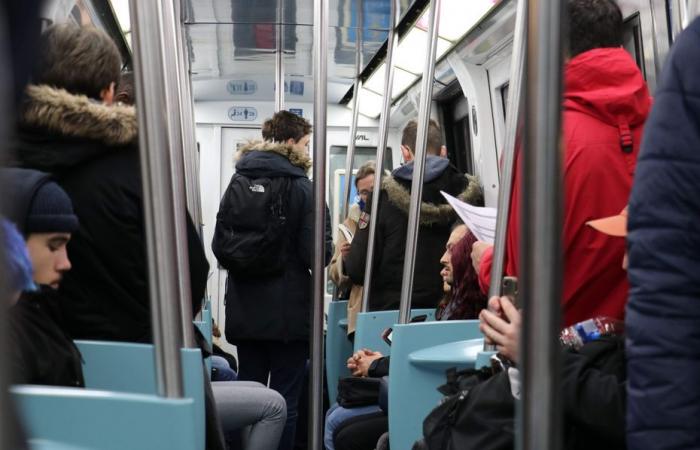
Since July 2024, Lille’s public transport network has been the subject of widespread controversy due to numerous accumulated malfunctions, with no date for a return to normal. Six months later, users and travel associations continue to seek compensation. Interview with the president of the MobiLille association Mattéo Ferrux.
The essentials of the day: our exclusive selection
Every day, our editorial team reserves the best regional news for you. A selection just for you, to stay in touch with your regions.
France Télévisions uses your email address to send you the newsletter “The essentials of the day: our exclusive selection”. You can unsubscribe at any time via the link at the bottom of this newsletter. Our privacy policy
This Tuesday, December 18, 2024 again, Ilévia users once again found themselves stuck in the Lille metro. Twenty minutes of interruption, quickly transformed into an hour of waiting. Already, on December 17, a major incident occurred on metro line 1, blocking traffic for four hours. The causes of the interruption are still unknown, but the mustard is seriously rising among the residents of the European Metropolis of Lille (MEL), victims of these repeated outages since last July.
Between tests for the new autopilot, bugs when opening doors, blocked lines and monstrous crowds in the busiest stations, the management of the Lille metro is widely singled out. A controversy that never ends and of which the inhabitants of the MEL (European Metropolis of Lille) do not see the end. This Wednesday, the MEL announced its intention toimpose on Ilévia and Alstom the extension of the automatic pilot probationary period until January 6, at least.
Mattéo Ferrux, president of the travel information and user defense association, Mobilille, testifies to this general fed up.
► ALSO READ : Ilévia: line 2 broken down, exasperation rumbles among metro users, despite reinforced service
Mattéo Ferrux : It all started in July with the enormous traffic problems experienced by the metro. Initially, I was not very invested in the cause, I followed from afar the speeches of regional councilor Julien Poix or those of Olivier Caremelle, the mayor of Lomme. I started to really get into it in September by launching a petition to ask users to be reimbursed. I looked into the operation of the metro, the financial arrangement of Ilévia, the entities that manage the public transport network… Mobility is a fascinating subject, especially in Lille where so much is happening, and where the problems never end.
Image d’archives.
•
© FREDERIK GILTAY / FRANCE 3
M.F. : Yes and we really don’t see the end of it. On line 2 things are stabilizing, even if in the morning the trains are still armored. On the other hand, on line 1, there was a big change a month ago. Following a decision – which stems from the MEL it must be said – to put the autopilot online on this line, the network has further deteriorated. I find this decision unacceptable, because Ilévia staff are not yet sufficiently trained in this automatic pilot.
M.F. : For staff to be officially operational, it takes nine months of training. And if we count the evenings where there were interruptions after 10 p.m. to test the autopilot and therefore train the staff, that’s only 25/30 hours of training. Afterwards perhaps they are trained on other times, but in all cases the quota is not reached. However, putting the autopilot online without Ilévia staff having received adequate training represents a real obstacle to the flow of traffic, and even a danger for users.
To get down to business, we can take the example of the new autopilot. This one experiences similar failures to the old driver. For example, door opening faults, which are resolved very quickly, because the problems already existed and the staff knows how to react. But when it comes to failures specific to the new pilot, things get bogged down because there is a lack of preparation. The unions themselves say this and ask for training.
► ALSO READ : Ilévia: brutal braking, loud announcements, doors that refuse to open… The struggle continues in the Lille metro
M.F. : It could be technical incidents, small bugs on landing doors that don’t open, or in the evacuation handles… At MobiLille, we have recorded 600 incidents of this kind since this summer. Yesterday, a train leaving the circuit went into evacuation state: the new equipment created a false contact, which cut the voltage on the network and therefore stopped all the trains. In the event of a blockage, people are often told to pull the evacuation handle: all along the line, frightened users pulled the handle, which only blocked the other trains even more, to the point of paralyzing the line. A sort of chain reaction which caused a gigantic outage from 8:30 a.m. until 12:30 p.m.
Every day, line 2 of the Lille metro is saturated during rush hours.
•
© FTV
The problem is the way Ilévia handled the crisis behind it. Frankly, we can call it a scandal. Too few relay buses were deployed, everyone was late and stuck in the same place, I saw people who had their cheeks pressed to the door, it looked like they were in Paris. In Fives, I have images of users who even found themselves on the road because the sidewalks were so armored, it’s really dangerous. Obviously there was no more information on the application.
M.F. : We can say that Ilévia is using this type of hyper-complex situation to rework its crisis management plan… But it seems that that is not the case. Yesterday, we faced total amateurism, with the same problems as since Transpole, or even before. As if the manager had existed for three days. Ilévia’s Twitter account, which must inform users in real time, contradicts itself from one tweet to another, it’s messy. People spend money on public transport that doesn’t work, they feel like cash cows.
What we are asking for is compensation for Ilévia customers. We are still at more than 27 hours of disruption time over a month. So the MEL will still say that for financial reasons, it cannot reimburse its residents, but what we can say is that Kéolis pays them thousands of euros in penalties every year for not compliance with the clauses of the public service concession contract. And this year, given the unprecedented disruptions we experienced for the July-September period, with nine minutes of frequency between each metro on line 2, I think that Keolis’ rating will be high again. So why not use it to compensate its residents and show that the Metropolis stands in solidarity with them?
We are also asking for more transparency from the MEL and Keolis (eoperator of the Ilévia network, editor’s note). We are joining forces with the Northern Travelers Union which is asking for a dashboard with explanations on the origin of the accidents which occurred during the week. But I know they won’t because they don’t want to be held accountable. This is why a mobilization is organized on Friday at 4 p.m., in front of the MEL, to ask to put an end to these problems for which we cannot see an end.





